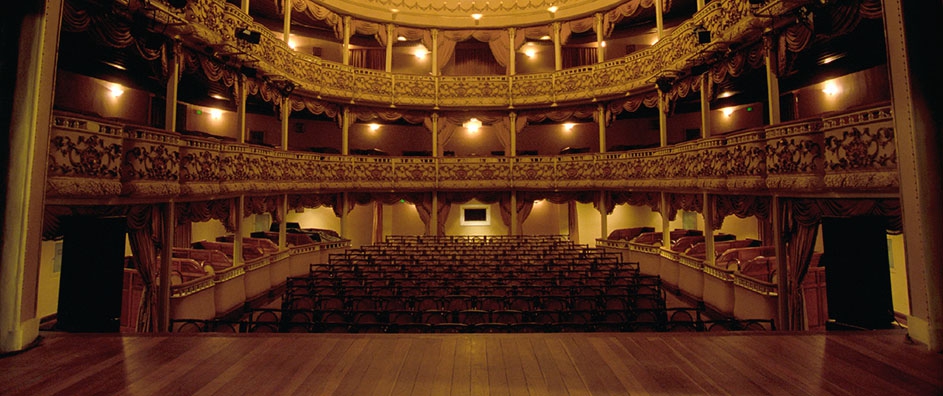The views expressed in our content reflect individual perspectives and do not represent the authoritative views of the Baha'i Faith.
The stage will be the pulpit of the future. – Abdu’l-Baha, quoted by Loulie Mathews in The Magazine of the Children of the Kingdom, June 1923.
Art has the unique and remarkable ability to share its messages without making people feel schooled, taught or lectured. We learn a tremendous amount from song lyrics, visual art, film and theater:
No the theater isn’t an industry . . . let’s not reduce ideas to the level of merchandise. The theater isn’t a bazaar . . . Isn’t the theater a school for morals? Isn’t it a pulpit? Victor Hugo says in the preface to Lucrezia Borgia, ’The theater is a tribune, the theater is a pulpit.’” – K. David Jackson, quoting the novelist Joaqim Maria Machado de Assis in Machado de Assis, A Literary Life
Theater is a pulpit which is the most powerful means of influence. – Konstantin S. Stanislavski, quoted in Sonia Moore, The Stanislavski System, The Professional Training of an Actor
It [theater] is an institution of cultural and moral education; besides being entertainment it should develop people’s tastes and raise the level of their culture. [It] must be beautiful entertainment, and it must embody serious ideas – Ibid
The great drama teacher Stanislavski recognized and abhorred the negative influences that can infiltrate and corrupt an actor’s soul. To prevent that outcome, he developed a training system meant to raise the actor and his art to the highest, most positive level:
Some actors and actresses love stage and art like fish love water. They revive in the atmosphere of art. Others love not art itself but an actor’s career, success; they revive in the backstage atmosphere. The first are beautiful, the others are abominable…. The habit of always being in public, of exhibiting oneself and showing off, of receiving applause, good reviews, and so on, is a great temptation; it accustoms an actor to being worshiped; it spoils him. His little ambitious person begins to need constant tickling…. To be content with such interests, one must be mediocre and vulgar. A serious artist cannot be satisfied for long with such existence, but superficial people are enslaved by the temptations of the stage, and become corrupted. This is why, in our work, more than in any other, one must constantly keep oneself in hand. An actor needs a soldier’s discipline. – Ibid.
Thus, Stanislavski warned:
With the same power with which theater can ennoble the spectators, it may corrupt them, degrade them, spoil their taste, lower their passions, offend beauty… – Ibid.
He explained:
My task is to elevate the family of artists from the ignorant, the half-educated, and the profiteers, and to convey to the younger generation that an actor is the priest of beauty and truth. – Ibid.
The Baha’i teachings include similar admonitions to artists of all mediums. They address the motive force for an artist’s creativity, which also helps control the ego:
Of all the arts and sciences, set the children to studying those which will result in advantage to man, will ensure his progress and elevate his rank. – Baha’u’llah, Tablets of Baha’u’llah, pp. 168-169.
Whatever is written should not transgress the bounds of tact and wisdom, and in the words used there should lie hid the property of milk, so that the children of the world may be nurtured therewith and attain maturity. We have said in the past that one word hath the influence of spring and causeth hearts to become fresh and verdant, while another is like unto blight which causeth the blossoms and flowers to wither. – Baha’u’llah, from a letter to an individual believer, in A Compilation of Use to Writers, compiled by the Research Department of the Universal House of Justice.
We have made it lawful for you to listen to music and singing. Take heed, however, lest listening thereto should cause you to overstep the bounds of propriety and dignity. Let your joy be the joy born of My Most Great Name, a Name that bringeth rapture to the heart, and filleth with ecstasy the minds of all who have drawn nigh unto God. We, verily, have made music as a ladder for your souls, a means whereby they may be lifted up unto the realm on high; make it not, therefore, as wings to self and passion. Truly, We are loath to see you numbered with the foolish. – Baha’u’llah, The Most Holy Book, p. 38.
From a Baha’i perspective, art exists to elevate the human soul.
Next: The Powerful Spiritual Influence of the Drama
















Comments
Sign in or create an account
Continue with Googleor